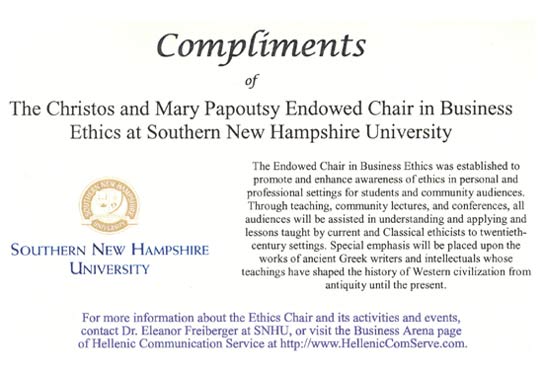
|
From Rich-Poor Relatives to Equal Partners: Towards a New Relationship between the Greeks of the Homeland and the Greeks of the Diaspora By Panos Mourdoukoutas Professor of Economics, Long Island University |
||
The Hellenic diaspora has always played an important role in the economy of the homeland. Yet the relationship between the diaspora and the Greeks of the homeland has been changing along with the world economy and the demographic composition of the diaspora. For the first three quarters of the 20th century, when the world economy was a collection of national and local markets separated by protectionism, government regulation and transportation and communication inefficiencies, Greeks of Greece and Greeks of the diaspora were two distinct and separate economic entities in a rich relative-poor relative relationship. Greeks living in Greece were the poor relatives while Greeks of diaspora were the rich relatives. As a rich relative, Greeks of diaspora were expected to contribute to Greece's efforts to develop with remittances, investment funds, philanthropy, and by buying Greek products. This was particularly the case from the 1950 to the early 1970s, a period of large outflow of Greek immigrants to Germany, the US and Australia, who kept close ties with their relatives back home. Accommodating this rich-poor relative relationship, Greek governments took a number of measures. To attract investment funds, for instance, Greece provided generous investment incentives, especially for funds flowing into backwards regions. To expand exports of Greek products, Greek governments provided export subsidies.
For the last quarter of the 20th century and the early 2000s, the world economy is no longer a collection of separate local and national economies, but a single integrated, a global economy. Within this global economy, Greeks of the homeland and Greeks of the diaspora are no longer two separate and distinct entities, in a rich relative-poor relative relationship, but a single entity in a partnership of equal relatives, for a number of reasons. First, Greece has made substantial economic progress, and is no longer the poor relative. Second, the world economy has changed. Travel is shorter and less expensive. Communication is more efficient and less expensive. Third, the demographic composition of diaspora is changing. The pool of first generation immigrants is contracting, while the pool of second and third generation is expanding. Ties between these generations and the homeland are weaker, and two sided. Fourth, financial capital is highly transferable across national boundaries. If Greek companies need to borrow money, they can do so in international markets. In this new equal partnership relationship, the two parties of the diaspora must bring their resources to the same table for the discovery and exploitation of new business opportunities. Greeks of the homeland should bring Greek membership in the EU, and long experience in the emerging economies of Eastern Europe and the former Soviet Republics, while Greeks of diaspora bring their experience in R&D, as well as their business development expertise, and managerial and entrepreneurial skills. How can this partnership be implemented? What should be the roles of the Greek government and SAE? The equal partnership between the Greeks of the homeland and the Greeks of the diaspora can be implemented with the creation and nurturing of new institutions that will bring together entrepreneurs from the two communities. One such institution is the creation of regular "business forums" between the two parties to foster strategic business alliances and to recycle the brain power among the members of diaspora: Greeks of US with Greeks of Canada, Greeks of Argentina with Greeks of Australia, and Greeks of Greece, and so on. Another institution is the organization of business exhibits, where different members of the diaspora can present their products and services to each other. A third institution is the program of Mentor Entrepreneur, where entrepreneurs of the Greeks of the diaspora serve as mentors to the entrepreneurs of the homeland. The US government, for instance, supports the Service Corps of Retirement Executives (SCORE). The Japanese government has established prefecture centers where retired executives provide business advice to entrepreneurs. The Irish government provides start-up entrepreneurs development advisers who assist entrepreneurs to build their business and to tap into private and government sources of funding. Both programs can be implemented within existing government agencies, such as the Hellenic Investment Center (ELKE), the Treasury for the New Economy (TANEO), the Information Society, the Ministry of Economic Development, and SAE. Regarding the role of SAE, I think, it is the only institution that is organized on a global scale, and therefore, can play the role of coordinator and catalyst in the formation and nurturing of these institutions. This article was presented in the 5th Regional Conference of Council of Hellenes Abroad (SAE). |
||
 |


